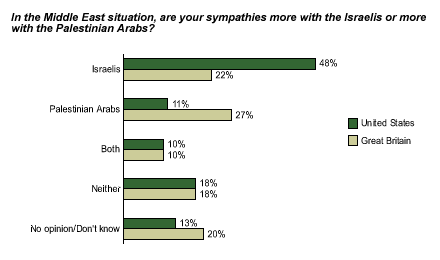Last week, Israeli Prime Minister Ariel Sharon cut short his visit to the United States in the wake of yet another deadly suicide bomber attack. A Gallup poll* conducted April 22-24 indicates that nearly half of Americans (48%) sympathize more with the Israelis than the Palestinians in this conflict, while only 11% sympathize more with the Palestinians. Results of a Gallup poll conducted in Great Britain** during the same period indicate that the British public is far more divided on this issue than the American public.

Gallup's latest poll of Britons (conducted before the withdrawal of Israeli troops from the Ramallah compound) asked, "In the Middle East situation, are your sympathies more with the Israelis or more with the Palestinian Arabs?" -- the same question asked in the U.S. poll. While a slightly higher proportion of British adults expressed greater sympathy for the Palestinians (27%) than the Israelis (22%), a majority did not express a preference, saying that their sympathies were with "both" (10%), "neither" (18%) or that they simply "don't know" (20%). Supporters of the Conservative Party were more likely to sympathize with the Israelis (33%) than the Palestinians (22%), while the Palestinians attract a higher proportion of support from the Labour Party (28%, versus 20% who sympathize with the Israelis) and Liberal Democrat Party (33%, versus 21% who sympathize with the Israelis). A similar relationship exists in America. Republicans are less likely to sympathize with the Palestinians than are Democrats (8% of Republicans, 13% of Democrats), though both sides favor Israel overall (58% of Republicans, 44% of Democrats).
The poll also indicated that the British public is largely pessimistic about the prospects for peace. When asked, "Do you think there will or will not come a time when Israel and the Arab nations will be able to settle their differences and live in peace?", a majority (58%) said no, while 36% said yes. U.S. results on this question*** are very similar -- 61% of Americans believe that peace will never come to the Middle East, compared to 36% who believe that it will.
*Results are based on telephone interviews with 491 national U.S. adults, aged 18 and older, conducted April 22-24, 2002. For results based on the total sample of national adults, one can say with 95% confidence that the maximum margin of sampling error is ±4%.
**Results are based on telephone interviews with 994 national adults in Great Britain, aged 18 and older, conducted April 17 through May 1, 2002. For results based on the total sample of national adults, one can say with 95% confidence that the margin of sampling error is ±3.1%.
***Results are based on telephone interviews with 1,009 national U.S. adults, aged 18 and older, conducted April 5-7, 2002. For results based on the total sample of national adults, one can say with 95% confidence that the margin of sampling error is ±3%.
